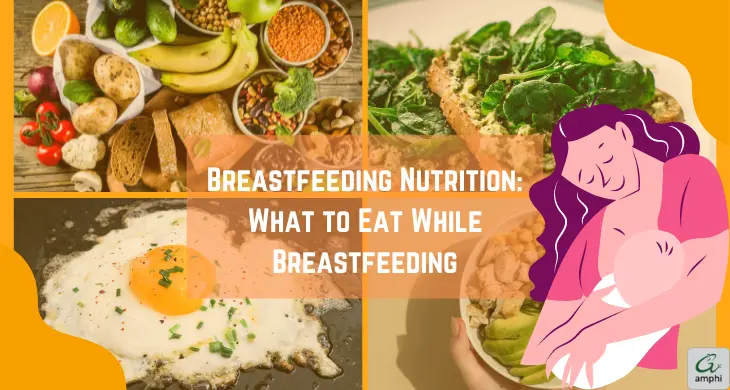Introduction
Breastfeeding is a beautiful and important bonding experience between a mother and her baby. As a breastfeeding mom, it’s crucial to prioritize your nutrition to support both your own health and the well-being of your little one. This article explores the topic of breastfeeding nutrition, guiding you on what to eat while breastfeeding. By understanding the essential nutrients and incorporating a balanced diet, you can ensure that you’re providing optimal nutrition for your baby while maintaining your own well-being.
- The Importance of Nutrition While Breastfeeding: Discuss why nutrition is essential during the breastfeeding period. Explain how a well-balanced diet supports the production of breast milk, promotes postpartum recovery, replenishes nutrient stores, and contributes to the overall health of both mom and baby.
- Key Nutrients for Breastfeeding Moms: Highlight the important nutrients that breastfeeding moms should focus on in their diet. Discuss the significance of macronutrients like carbohydrates, proteins, and healthy fats, as well as micronutrients such as vitamins and minerals.
- Foods to Include in a Breastfeeding Diet: Provide a comprehensive list of foods that are beneficial for breastfeeding moms. Discuss the importance of incorporating a variety of fruits, vegetables, whole grains, lean proteins, dairy or plant-based alternatives, and healthy fats. Emphasize the value of consuming nutrient-dense foods and avoiding processed or sugary options.
- Hydration and Fluid Intake: Explain the importance of staying hydrated while breastfeeding. Discuss the increased water needs during lactation and provide tips for ensuring adequate fluid intake. Encourage moms to drink water, herbal teas, and other healthy beverages throughout the day.
- Foods to Limit or Avoid: Address foods that may potentially affect breast milk composition or cause discomfort for the baby. Discuss common culprits such as caffeine, alcohol, spicy foods, certain allergens, and excessive intake of fish high in mercury. Provide guidance on moderation or avoidance based on individual circumstances.
- Meal Planning and Snack Ideas: Offer practical suggestions for meal planning and snack ideas that are nutritious, convenient, and support breastfeeding. Provide sample meal ideas, including breakfast, lunch, dinner, and snacks. Emphasize the importance of having healthy, grab-and-go options readily available.
- Seeking Professional Guidance: Highlight the importance of consulting with a healthcare professional or registered dietitian for personalized nutrition advice. Every woman’s nutritional needs may vary, and professional guidance can help address specific concerns or dietary restrictions.
Conclusion
Prioritizing nutrition while breastfeeding is essential for both your own well-being and the health of your baby. By focusing on a well-balanced diet, incorporating key nutrients, staying hydrated, and being mindful of food choices, you can ensure that you’re providing optimal nutrition for your little one. Remember, a nourished and healthy mom is better equipped to enjoy the breastfeeding journey and provide the best start in life for her baby.
FAQS:-
Ques: Why is nutrition important while breastfeeding?
Ans: Nutrition is important while breastfeeding because the quality of breast milk depends on the mother’s diet. A well-balanced diet ensures that you’re providing your baby with essential nutrients for growth and development. Additionally, proper nutrition supports postpartum recovery and helps maintain your own health and energy levels.
Ques: What are the key nutrients breastfeeding moms should focus on?
Ans: Breastfeeding moms should focus on consuming an adequate amount of macronutrients (carbohydrates, proteins, and healthy fats) and micronutrients (vitamins and minerals). Key nutrients include calcium, iron, omega-3 fatty acids, vitamin D, vitamin B12, and folate. These nutrients are essential for both you and your baby’s health.
Ques: What foods should I include in my breastfeeding diet?
Ans: Include a variety of fruits, vegetables, whole grains, lean proteins (such as poultry, fish, beans, and tofu), low-fat dairy products or plant-based alternatives, and healthy fats (like avocados, nuts, and seeds). Aim for a balanced diet that provides a range of nutrients. It’s also beneficial to include foods rich in breastfeeding-friendly nutrients like iron, calcium, and omega-3 fatty acids.
Ques: How important is hydration during breastfeeding?
Ans: Staying hydrated is crucial during breastfeeding. Drink plenty of water throughout the day to satisfy your increased fluid needs. Herbal teas, fruit-infused water, and other healthy beverages can also contribute to hydration. Proper hydration supports milk production and helps you feel energized.
Ques: Are there any foods to limit or avoid while breastfeeding?
Ans: Some breastfeeding moms may find that certain foods affect their baby’s digestion or cause discomfort. Common culprits include caffeine, alcohol, spicy foods, allergenic foods (such as peanuts or cow’s milk), and fish high in mercury. Pay attention to how your baby reacts to different foods and adjust your diet accordingly.
Ques: Do I need to take any supplements while breastfeeding?
Ans: Most breastfeeding moms can meet their nutrient needs through a balanced diet. However, your healthcare provider might recommend certain supplements, such as a prenatal vitamin or vitamin D, depending on your individual circumstances. Consult with your healthcare professional for personalized advice.
Ques: Can I lose weight while breastfeeding?
Ans: It’s possible to lose weight gradually while breastfeeding, but it’s important to do it in a healthy and gradual manner. Aim for a balanced diet and gentle physical activity. Rapid weight loss or extreme dieting can affect milk supply and nutrient levels. Consult with a healthcare professional for guidance on weight management while breastfeeding.
Ques: What if I have specific dietary restrictions or allergies?
Ans: If you have specific dietary restrictions or allergies, it’s important to find suitable alternatives to meet your nutritional needs. Work with a registered dietitian or healthcare professional who can help create a personalized breastfeeding meal plan that accommodates your dietary restrictions.
Remember, maintaining a healthy and balanced diet while breastfeeding is important for both you and your baby. Prioritize your nutrition, stay hydrated, and consult with healthcare professionals for personalized guidance to ensure you’re providing the best possible nutrition for your little one.

